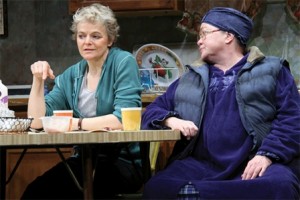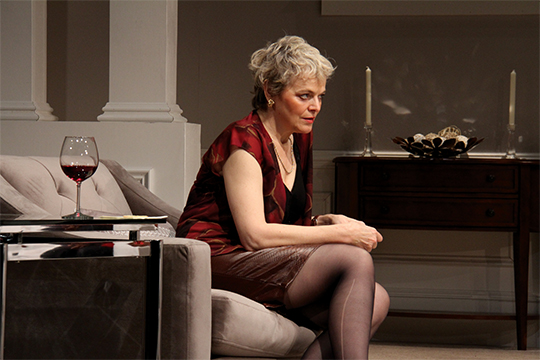
Ellen McLaughlin and Cynthia Lauren Tewes in GOOD PEOPLE at George Street Playhouse. (Photo credit: Gerry Goodstein)
David Lindsay-Abaire’s highly acclaimed and oft-produced play about American class divide and the perspectives that define it, now receiving a lively staging at New Brunswick’s George Street Playhouse, is brimming with lightning-quick wit, but beyond the regularly hilarious dialogue lies a penetrating and unsentimental examination of life and ethos at either extreme of the class spectrum. Director David Saint and his excellent cast capitalize eagerly on the play’s laugh lines, but the production is also certain to dwell dutifully on the unpleasant. The result is a play that challenges us to see past the veneer of courtesy and humor, and into the fraught souls of characters whose lives have lead them in starkly different directions.
The play opens as Margaret (Ellen McLaughlin) loses her cashier job at the dollar store — plagued by unreliable sitters for her severely mentally and physically handicapped adult daughter, Margaret is consistently late, and the district manager has had enough — leaving her with no income to pay her rent or bills, to say nothing of her daughter’s medicine. As Margaret sips coffee with friends commiserating the job loss and the bleak market for even minimum wage positions, Jean (Marianne Owen) suggests looking up an old flame of Margaret’s from the neighborhood, Mike (John Bolger), who made it out of Southie to become a successful physician with his own practice, in hopes that he may have a job open at his office, be that answering phones, filing, or cleaning the floors.
The two meet in that awkward way that old friends who have not seen each other in the many years since their lives diverged often do, and although Mike has no jobs to offer Margaret, the two agree that she will come to his birthday party so that she might network with his friends who may have openings at their businesses. Margaret’s arrival at Mike’s house in the play’s second act transitions from awkward through tense to heated, as GOOD PEOPLE shows us its investment in the class divide most fully. The strained courtesy Margaret and Mike shared at his office soon evaporates as bitterness, bias, and stories of the past fuel a fiery standoff between the woman stuck in Southie and the man who escaped.
Ultimately, GOOD PEOPLE is a play less about the empirical realities of America’s class divide than it is about perception. The tense act-two agon between Margaret and Mike builds around how each perceives the other’s lot in life. For Margaret, Mike had important help — a father in his life, for one — and got a number of lucky breaks along the way to success. For Mike, Margaret made bad choices in life, from childhood until the present, and her poverty and struggles are a direct result of those decisions. Both of course oversimplify their analysis of the other, as this play concerns itself primarily with the battle to craft the narrative of the self and the other. If Mike can get Margaret to believe she’s made choices, maybe he can get her off his back. If Margaret can get Mike to understand her point about luck, maybe she can get him to help her. That both are so deeply entrenched in their own narrative at once reveals and interrogates the value of controlling the perception of one’s life.
The most thoroughly complex character here is of course Margaret, made vivid at George Street by the exceptional Ellen McLaughlin. The people around Margaret — both her Southie compatriots and the “lace-curtain” Mike and his wife Kate—are dutifully committed to their places in society and all the presumptions that accompany such a commitment, but Margaret is a more astute observer of the world. As Margaret and Mike first meet in his office, Ms. McLaughlin embodies the stiff bodily tension and halting speech patterns of a woman from the slums very much out of her element. But as the scene progresses, and Margaret begins to recognize her old friend more fully, we see all the physical traits of comfort and familiarity creep back. The same protean comfort level marks Margaret’s time in Mike’s living room. Ms. McLaughlin’s Margaret largely eschews the bitterness and anger we might expect of the character, which helps make the moments where she comes closest to cracking much more powerful.
The themes and investments of GOOD PEOPLE are much too weighty to call it a comedy, but it would be a mistake to overlook how consistently funny it is, aided in large part by the hilarious obliviousness of Cynthia Lauren Tewes’s Dottie and the dry gallows humor of Margaret. Mr. Saint does well to manage the play’s unique flow between humor and tension, recognizing and underscoring astutely those moments humor is being deployed as a coping mechanism for pain and anxiety. And while George Street’s use of sliding walls and sets with occasionally projected scenery was more novel and successful in THE BEST OF ENEMIES, the technique gives the production a welcome briskness.
The complaint that GOOD PEOPLE dilutes its social commentary in humor would not be entirely unfounded, but George Street successfully locates and accentuates the heart of that commentary. In a country as tensely divided by class bitterness as the United States currently finds itself, this play asks us to recognize the human faces behind simplistic monikers like “upperclass” and “lowerclass”. At once timely and important, it is a play about the perpetual imbalance between choice and circumstance, the people who find themselves teetering on that edge, and the clash of perception between those people.
GOOD PEOPLE
By David Lindsay-Abaire
Directed by David Saint
January 29 – February 24, 2013
George Street Playhouse
9 Livingston Avenue
New Brunswick, NJ, 08901
732-246-7717
http://www.georgestreetplayhouse.org/


